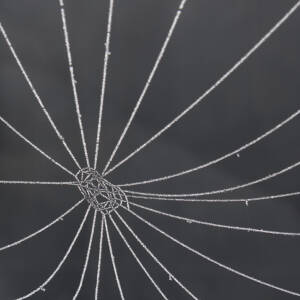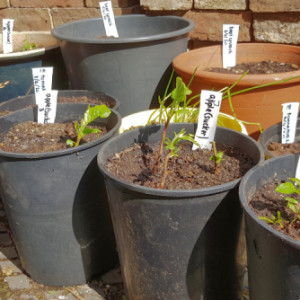Malum
The leaves on the apple tree are out and with the sun on them they glow like tiny green lanterns. I hadn't thought about it before but this is how Christmas tree fairy lights herald spring.
I never expected to lie in the hammock under this tree again; now it seems as if I might even get to harvest some of the fruits. To try to assure myself of a few apples further into the future I spent the morning having a go at propagating it. It is a true tree, not a graft, (Edit - I later discovered that it is in fact a graft) so I cleared the soil away from twenty suckers, cut them clean off the hefty root they were growing from, selected those with the hairiest roots and potted them. Then I took some cuttings from the twigs, dipped them in rooting hormone and potted those too (extra). If I had some root stock I would try grafting but I don't.
All the while I was thinking about reading Virgil's Georgics at school. I would really struggle reading the Latin now, even with a translation alongside, but somehow the delight of it has stayed in my memory.
Perhaps, partly, it's near the top of my mind because I've recently received (several times!) a chain letter titled Poem Exchange. I've broken the chain but I have sent poems as requested to those at the top of the list. I had a thank you email from one of them, who I don't know, a professor of Latin at Wadham College. My Latin teacher, who I stayed in touch with for a few years after he coaxed me through 'A' level at our very unclassical comprehensive school, had been to Wadham and it prompted me to google him. I was sad to learn that he died last summer. So, thank you, Geoffrey Fallows, for all that poetry whose echoes have stayed with me through the years. This one's for you (Latin below):
Firstly Nature has various ways of propagating trees.
Some, unforced by Man, appear far and wide, on their own,
and colonise the plains and the winding rivers:
such as the pliant osier and the slow-growing broom,
the poplar and the pale silver-leafed willow:
others spring from fallen seed, like the tall
chestnut, the broad-leaved oak of Jupiter’s groves,
and the oak the Greeks consider to be oracular.
With others a dense thicket sprouts from the roots,
as in cherries and elms: even the laurel of Parnassus
springs as a tiny shoot, in its mother’s extensive shade.
These are the methods Nature first ordered: by these means
every kind of forest tree, shrub, and sacred grove flourishes.
There are others that practice has found out for herself,
in her own way. This man cuts shoots from the tender trunk
of the mother tree, and sets them in furrows: that one buries
stems in the ground, as cross-cut stakes and pointed spikes:
other shrubs wait to be bent in curved layers,
and the shoots gain life from their own soil:
others need no roots, and the pruner has no fear
of cutting the top, and trusting the tip to the earth.
Amazing to say, when an olive-trunk is cut,
an olive root thrusts itself out of the dry wood.
And often we see one tree’s branches harmlessly
given over to another’s, a pear altered to carry grafted apples,
and stony cornelian cherries blushing on a plum.
(translation by AS Kline who, in a twist of coincidences, studied maths at the University of Manchester where I dropped Latin and nearly but not quite took up maths)
Principio arboribus uaria est natura creandis.
namque aliae nullis hominum cogentibus ipsae
sponte sua ueniunt camposque et flumina late
curua tenent, ut molle siler lentaeque genistae,
populus et glauca canentia fronde salicta;
pars autem posito surgunt de semine, ut altae
castaneae, nemorumque Ioui quae maxima frondet
aesculus, atque habitae Grais oracula quercus.
pullulat ab radice aliis densissima silua,
ut cerasis ulmisque; etiam Parnasia laurus
parua sub ingenti matris se subicit umbra.
hos natura modos primum dedit, his genus omne
siluarum fruticumque uiret nemorumque sacrorum.
sunt alii, quos ipse uia sibi repperit usus:
hic plantas tenero abscindens de corpore matrum
deposuit sulcis, hic stirpes obruit aruo,
quadrifidasque sudes et acuto robore uallos.
siluarumque aliae pressos propaginis arcus
exspectant et uiua sua plantaria terra;
nil radicis egent aliae summumque putator
haud dubitat terrae referens mandare cacumen.
quin et caudicibus sectis (mirabile dictu)
truditur e sicco radix oleagina ligno;
et saepe alterius ramos impune uidemus
uertere in alterius, mutatamque insita mala
ferre pirum et prunis lapidosa rubescere corna.


Comments
Sign in or get an account to comment.


